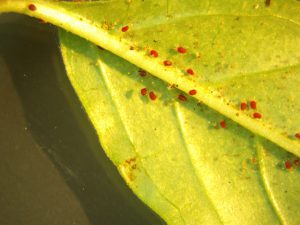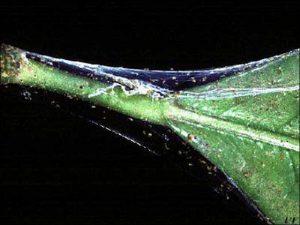I was recently asked what kind of fungus was affecting a plant brought into the UF/IFAS Leon County Extension Office. Upon close inspection, it was not a fungus at all, but turned out to be damage from spider mites and the little critters were right there on the plant.
Spider mites, as the name implies, are eight-legged creatures that are kin to spiders and in the mite and tick group of arachnids. They can cause damage to ornamental, fruit, and vegetable plants, especially in hot, dry weather or when grown in greenhouses or indoors. The plants that came into the office had been growing in a greenhouse.
Spider mites are a piercing, sucking pest that pierce their mouthparts into the leaf tissue to suck out nutritious plant saps. High densities of spider mites can pull enough plant tissues out to cause a light colored, grayish look to the leaves, somewhat resembling downy mildew damage. Upon close inspection, small brown to red dots on the bottom of the leaf and/or spider web-like webbing along the stem and petioles may be observed, confirming the identification of spider mites.
Plants grown outdoors don’t usually experience spider mite damage, as natural predators such as lady beetles, minute pirate bugs, thrips, and lacewings provide biological control. For spider mite infestations on houseplants or in greenhouse operations, control can be achieved through physical and chemical control. As part of an integrated pest management plan, regular monitoring of these plants can help identify problems before they get too bad. Sprays of water and rubbing undersides of leaves can remove many spider mites and provide control of small populations. If that doesn’t take care of them or they are at infestation level, insecticidal soaps and horticultural oils can provide adequate control.
Remember that correct identification is key to properly controlling a pest. If the damage was treated as a fungus and a fungicide sprayed, the pest would not be controlled, and time, money, and product would be wasted. If you have questions regarding what is ailing your plants, contact your local UF/IFAS Extension office.
- When to Worry About Your Citrus During Cold Weather - December 18, 2025
- A Tale of Two Hoses - November 13, 2025
- Anthracnose and Aster Yellowing Diseases Recently Diagnosed - August 28, 2025


